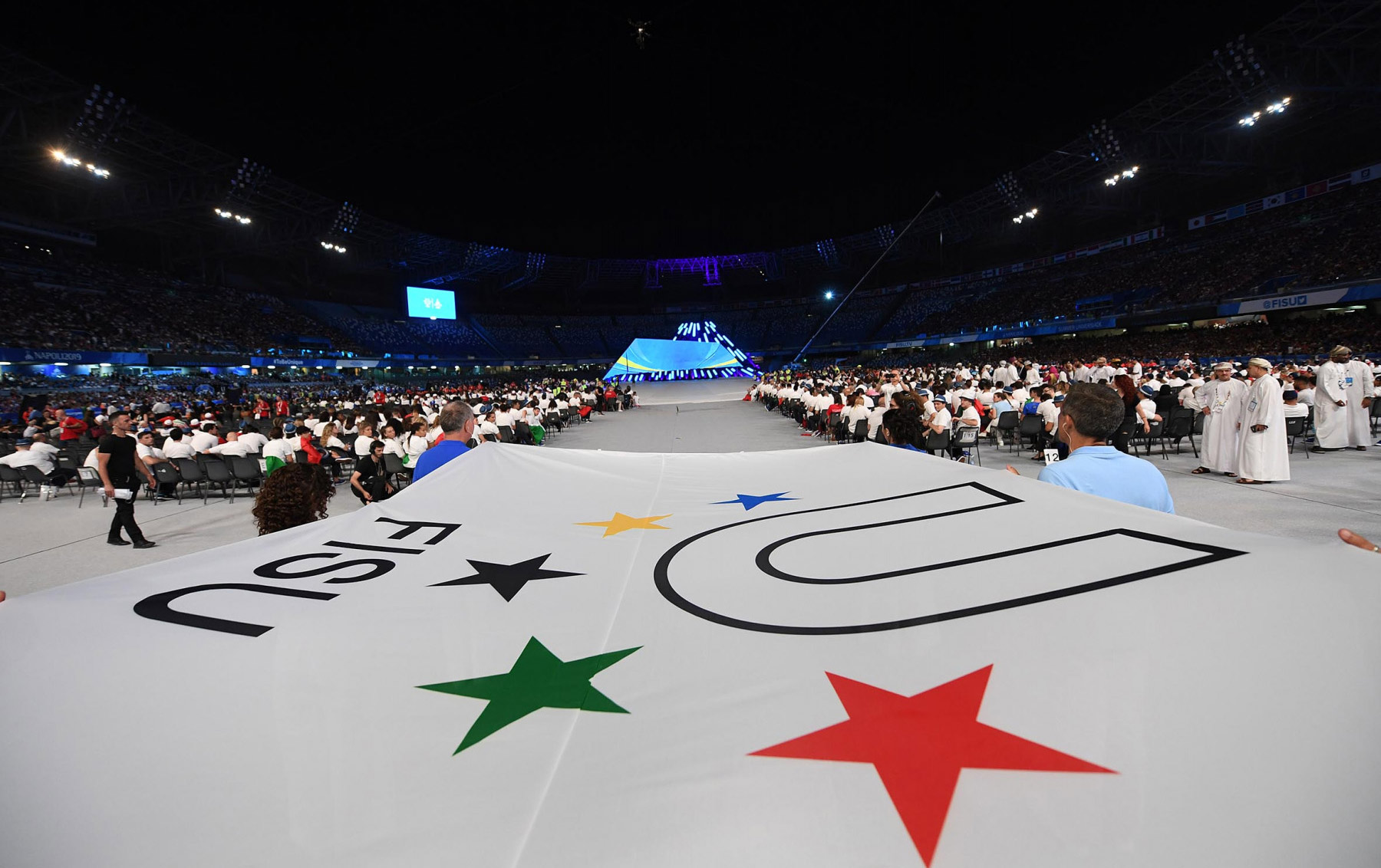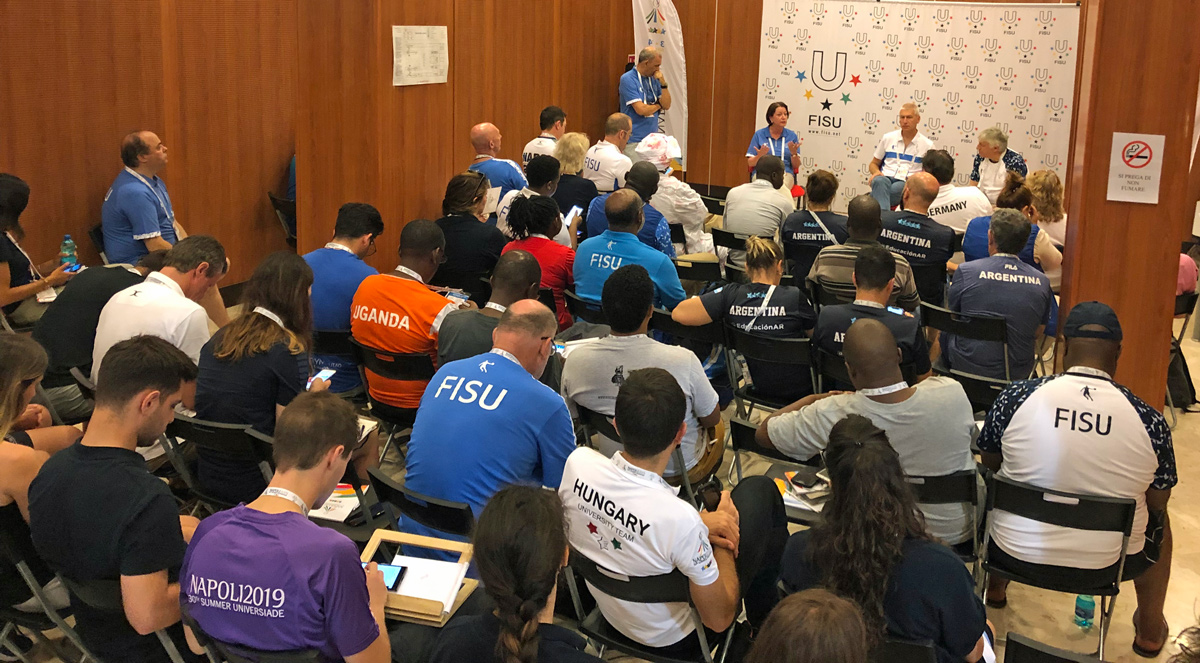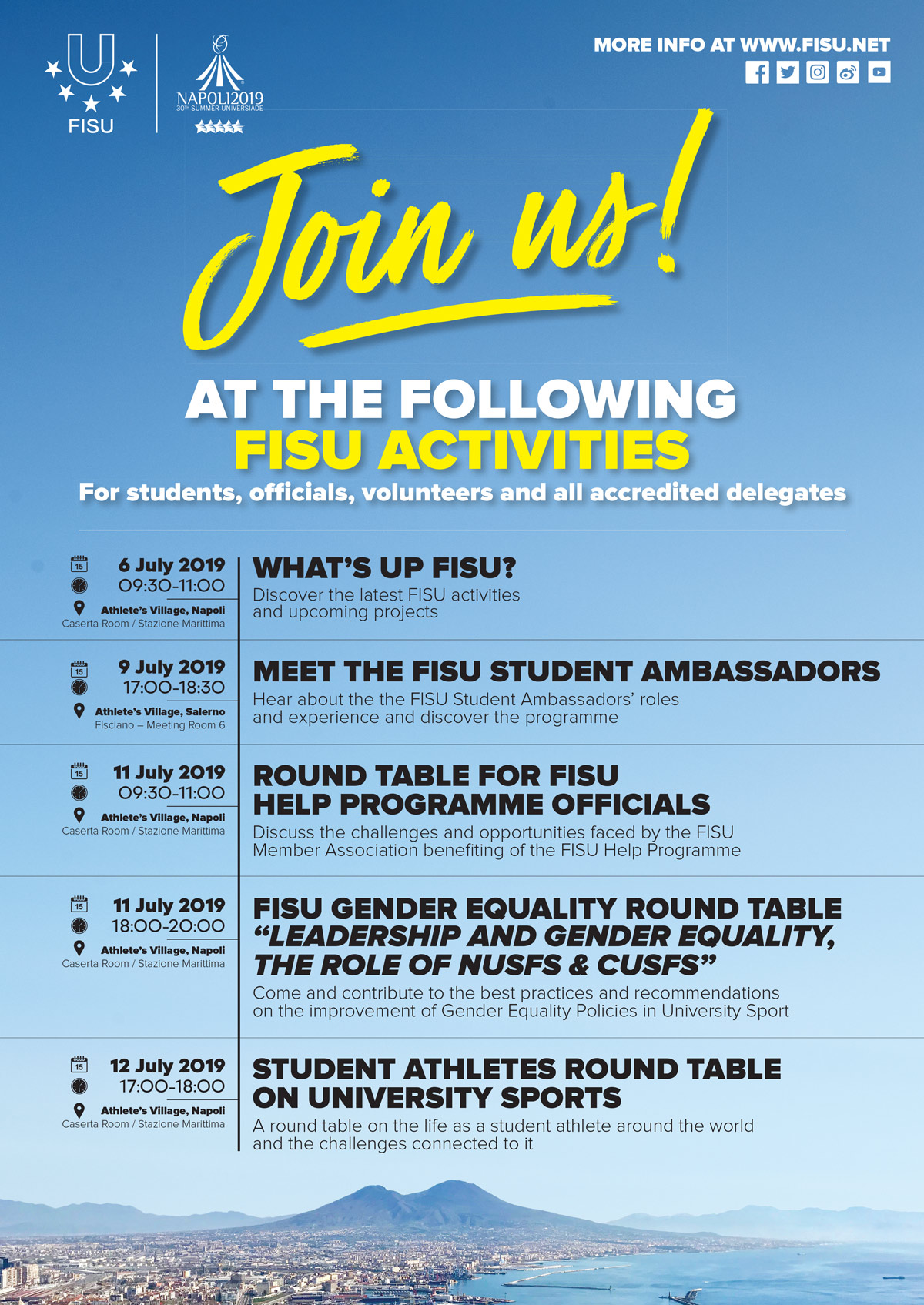
NAPOLI, 6 July – It was 58 years ago that U.S. President John F. Kennedy uttered his historic words, “Ask not what your country can do for you – ask what you can do for your country.” On Saturday morning, at the ‘What’s Up FISU?’ update session held as part of the 30th Summer Universiade, it was FISU’s turn to ask its membership, “What can we do for you?”
FISU President Oleg Matytsin Secretary General – CEO Eric Saintrond and Senior Executive Committee Member Verena Burk welcomed representatives from 20 member countries and all five continents for a panel discussion moderated by education committee member Sami Garabedian.
A wide variety of topics that were discussed included, to name only a few, education, physical activity and healthy lifestyle, sustainability, social responsibility, dual career, best practices, communication and cooperation, marketing and promotion, relationships with national university sport federations, FISU’s 70th anniversary, and the organization’s vision for the future.
 The ‘What’s Up FISU?’ event was well attended by the university leadership community, the first of four education-themed events during the 30th Summer Universiade
The ‘What’s Up FISU?’ event was well attended by the university leadership community, the first of four education-themed events during the 30th Summer Universiade
Key FISU projects and programs that were highlighted included the International Day of University Sport (IDUS), FISU Volunteer Leaders Academy (FVLA), Academic Advisory Board and FISU University World Cups.
Matytsin stressed the importance of communication between FISU and its membership.
 “Communication is definitely a key factor to be successful. It’s very important to seek and receive feedback from people who are responsible for national federations and for our students. We try to use every opportunity to meet with people, to explain our policies. Not just speak, listen as well. Today, we had a very good dialogue and productive exchanges about our challenges and our vision for the future. Communication with our federations will be key in the future.”
“Communication is definitely a key factor to be successful. It’s very important to seek and receive feedback from people who are responsible for national federations and for our students. We try to use every opportunity to meet with people, to explain our policies. Not just speak, listen as well. Today, we had a very good dialogue and productive exchanges about our challenges and our vision for the future. Communication with our federations will be key in the future.”
What are the key challenges the organization currently faces, according to the president?
“Again, communication. We have 174 federations and not all of them have the same level of structure. We need better communication in order to be able to help them in general, help them get better organized. This is why a session like the one we had today is very important.
“In order for FISU to continue to grow, we need to have communities like politicians, university presidents and rectors, student-athletes be a real part of our strategy. Stress the importance of sport in their daily life, continue to integrate sport and education. Education through sport.”
According to Saintrond, FISU is currently in a good place but one major challenge, more often than not, is the lack of human resources and financial means.
“We have a lot of projects, many things on the go, but we don’t always have the means to make them happen, or make them happen with a maximum of efficiency. Budgets are limited when we consider the magnitude of some of these projects. This being said, FISU has already achieved a lot in terms of growth and development. When I started with FISU in 1985, we had a staff of three, today it’s 40. We had three or four world championships, today we have 35. We’ve strengthen our relationships with international organizations like the IOC and WADA. Today, we exist. We’re well-recognized as an international sport organization.
“What we need to do now is reconnect with universities and strengthen our national federations. Our national federations face the same challenges we face in terms of financial means, staff, etc. We need to help our federations get better recognition at the national level. A nice success story is the Russian federation. After the collapse of the Soviet Union, they went through a difficult period. But today, after hosting successful Universiades in Kazan and Krasnoyarsk, and with the Summer Games going back there in 2023, they are a very powerful sport organization in Russia.”
Burk agreed that strengthening relationships with the membership is key to FISU’s future, but says helping student-athletes as they try to combine athletic excellence with their studies should also be a priority in coming years.
“I think we should be deeply involved in the topic of dual career. It’s not easy these days for our athletes to combine success on the field of play and in the classroom. I believe we can help national university sport federations either improve or develop their systems in that regards. Today, one of the participants asked, what can we do for FISU? We ask also, what can we do for our national sport federations? This kind of dialogue is very important for us. An open dialogue to better understand the wishes and needs of our membership, and on their end to see how they can contribute to the future of FISU. Because they are FISU.
As the chair of both the FISU’s media and communication and education committees, Burk is understandably proud of some of the organization’s current initiatives.
“I know president Matytsin and the executive committee are very proud of the Ambassadors Program and the Volunteer Leaders Academy. It’s a great platform to spread our message, share the values of FISU around the world. And of course, if you ask me personally, as chair of the media and communication committee, I’m very proud of the FISU Young Reporters Programme. We already see a legacy. We have former participants here in Naples covering the Universiade, and there are now alumni who are in high positions either in media or as press officers, so it’s really nice to see that.”


